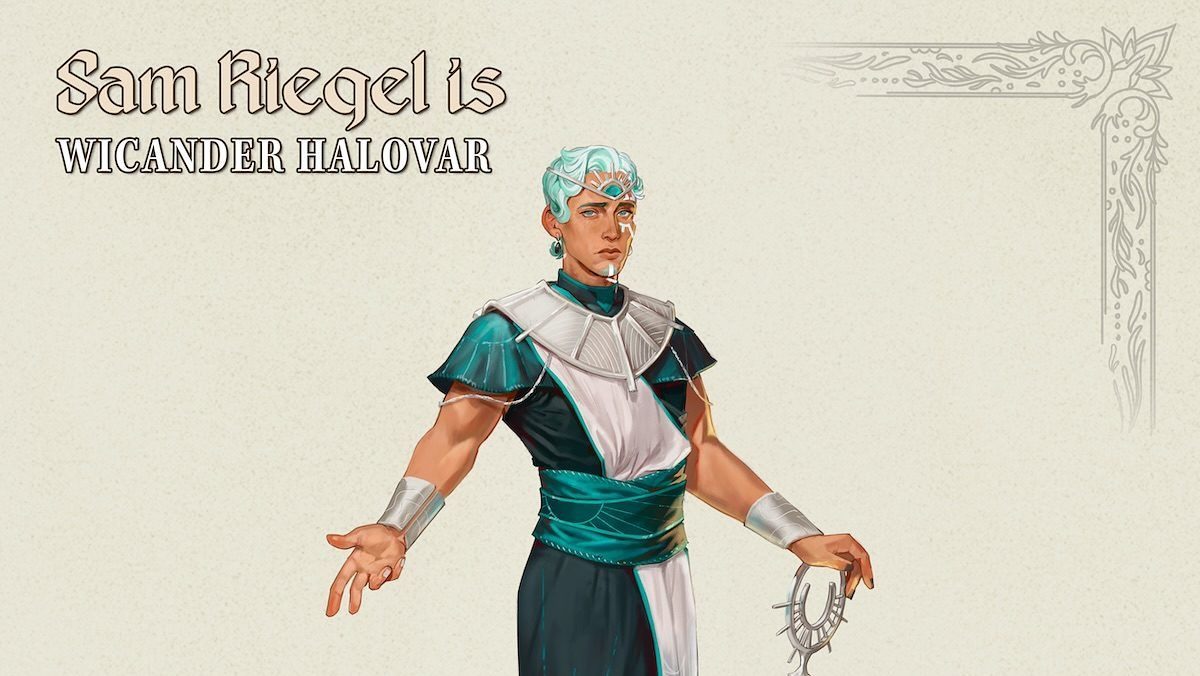
In the latest campaign of Critical Role, Sam Riegel’s new character, Wicander Halovar, seems to be keeping something hidden, and details about his abilities suggest he’s involved in some secret activity. Viewers were introduced to Wick, a member of the influential House Halovar, last week. He’s a priest of the Candescent Creed, a relatively new religion that has become popular since the gods of Adamar died seventy years prior to the show’s events.
The Candescent Creed is different from many religions in D&D games because it doesn’t focus on worshipping a god. Instead, its followers believe in a universal Light that offers salvation and guides their morals. They believe that when people die, their souls return to this Light.
The Candescent Creed is becoming increasingly powerful in Dol-Makjar, but there are worrying signs that something sinister is happening within the religion. Specifically, they’re known to work with demons, bringing them into our world and trying to convert them by sharing their beliefs about the Light.
Some suspect House Halovar created the Candescent Creed themselves, rather than receiving it from a god. According to Aranessa Royce, the House can use the Creed to control people by presenting their own ideas as religious doctrine.
A potential issue with the Candescent Creed is highlighted by Wicander Halovar, the character played by Sam Riegel. Wicander is a priest of the Candescent Creed who frequently references scripture and details his religion’s beliefs early on. While *Critical Role* describes him as a Cleric, his character statistics suggest something different.
How Wicander’s Stats Suggest That He’s Perhaps NOT a Cleric (and Maybe a Soul Sorcerer) in Critical Role Campaign 4
In *Dungeons & Dragons*, the Cleric class relies on Wisdom to power their spells – the higher a Cleric’s Wisdom score, the stronger their magic. However, the character Wicander has a fairly average Wisdom score of just 10, which is actually his lowest stat. This suggests that the player, Sam, isn’t building Wicander to be a very effective Cleric.
Like many of Sam’s characters, Wicander is likely more complex than he appears. His highest ability is Charisma, which strongly suggests he’s one of four character classes in Dungeons & Dragons 5th Edition: a Bard, Paladin, Sorcerer, or Warlock. It seems Sam is probably playing one of those classes, and Wicander is pretending to be a Cleric to conceal his true identity.
With several Paladins and Warlocks already in the campaign, it seems Wicander is probably a Sorcerer or a Bard. One particular Sorcerer type, the Divine Soul Sorcerer, gets their power from a divine source – they’re either related to a god, or act as a channel for divine magic. Many fans of *Critical Role* think Wicander might be a Divine Soul Sorcerer who is either pretending to be a Cleric, or truly believes he is one.
Why Would Wick Pretend to be a Cleric?
Why was Wicander pretending to be a Cleric? The most probable reason connects to the Candescent Creed and where it came from. Information shared before the campaign by Brennan Lee Mulligan and Matt Mercer revealed that the gods were killed after a lengthy and brutal war between their followers and those who revolted against them.
The death of the gods dramatically altered magic. Long-distance teleportation is now much more dangerous, and people no longer pass on to an afterlife when they die. We’re still unsure of the extent of the gods’ influence on the world – for example, if they had any demigod children or powerful celestial beings like solars and planetars serving them.
The simplest explanation is that Wicander has natural divine abilities, but he’s pretending to be just a cleric. These powers would help establish the Candescent Creed as legitimate and also shield Wicander and his family from the truth about their divine heritage. House Halovar is one of five families who rose to power after the gods died in the Shapers War, making it especially intriguing if they still have some connection to the gods they helped destroy.
As a huge fan of *Critical Role*, I remember how cleverly they kept Chetney’s true identity a secret! When he first appeared, everyone thought he was a Rogue, but it turned out he was actually a Blood Hunter. They did this to disguise the fact that he was a lycanthrope, though a lot of us fans actually figured it out pretty quickly – his stats and how he acted just didn’t quite *fit* a typical Rogue!
It’s obvious Sam Riegel is keeping something about his character, Wicander Halovar, under wraps, which is great! Riegel is known for revealing character secrets through compelling storytelling. Given that Wicander deeply believes in the Candescent Creed, it would be fascinating to see him discover that his faith is actually a fabricated control mechanism.
It’s still early in the campaign, so it’s difficult to predict where this new development will lead. Critical Role fans should simply follow Wicander’s story and see what happens.
Read More
- 2025 Crypto Wallets: Secure, Smart, and Surprisingly Simple!
- Gold Rate Forecast
- Brown Dust 2 Mirror Wars (PvP) Tier List – July 2025
- Banks & Shadows: A 2026 Outlook
- ETH PREDICTION. ETH cryptocurrency
- The 10 Most Beautiful Women in the World for 2026, According to the Golden Ratio
- HSR 3.7 story ending explained: What happened to the Chrysos Heirs?
- 9 Video Games That Reshaped Our Moral Lens
- Uncovering Hidden Groups: A New Approach to Social Network Analysis
- Gay Actors Who Are Notoriously Private About Their Lives
2025-10-06 17:04